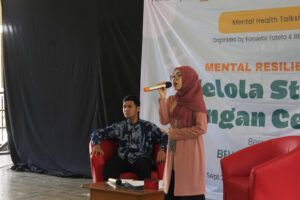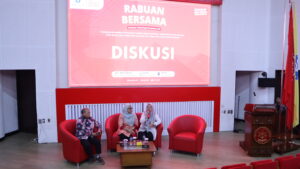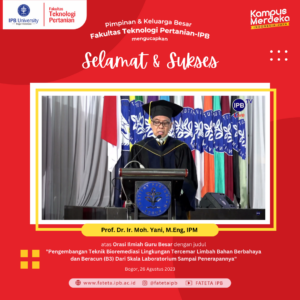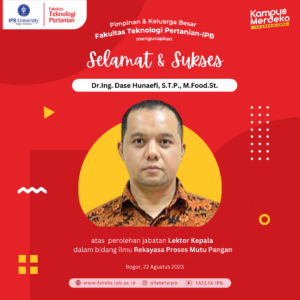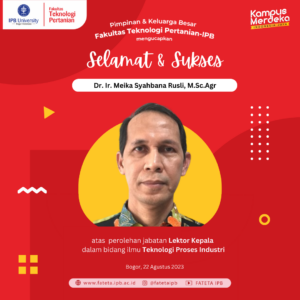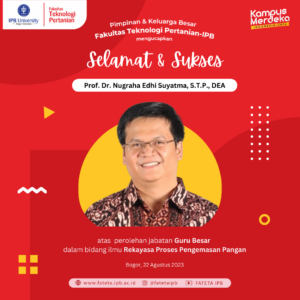The Department of Mechanical and Biosystem Engineering, Faculty of Agricultural Technology (Fateta) IPB University held its first webinar series in collaboration with the Directorate General of Renewable Energy and Energy Conservation, Ministry of Energy and Mineral Resources (Ditjen EBTKE, Ministry of Energy and Mineral Resources) and Indonesian Biomass Energy Producers (PEBI) , 11/6. This event raised the theme about the Prospect of Using Biomass Stoves as an Alternative Energy Fulfillment for Households and Small Industries. This subtantive discourse is a part of the urgency in using biomass as a substitute for fossil fuels inlight with the realization of the Bills on Renewable Energy (EBT).
Andriah Feby Misna, ST, MT as Bioenergy Director of the Directorate General of EBTKE said that, the government continues to strive for the advance discovery of renewable energy. This agenda was motivated by the highly dependence of our society on fossil fuels and the results of agricultural waste that has not been utilized.
The use of EBT sourced from biofuels is currently reaches only around 3 percent, while the EBT power plants only reach 6 percent of the 25 percent target. Aside from that, the current EBT development agenda has only been realized for 1.9 percent from at total target in 2025 is around 5.5 percent.
“Whereas the potential of agricultural waste products governance is very sufficient for the national energy needs that roughly around 32 gigatons, in accordance to the updated survey. Therefore, the government needs to work hard in achieving these targets. So that, the preparation of the EBT Bill is expected to be quickly realized and soon able to explore and manage the potential of EBT, especially in the areas that have not been touched by the electricity, “he said.
Ir Sri Endah Agustina, MS, lecturer of IPB University in the Renewable Energy Engineering Division, Mechanical and Biosystem Engineering Department who is actively engaged in the Indonesian Renewable Energy Society (METI) also sharef her substantive view on the development of biomass energy. According to her, Indonesia has the very strategic potential for developing biomass, especially in regard to the processing of agricultural and plantation sector waste into brickets for the use of biomass stoves. Cassava stems, palm oil waste, husks, paper waste, corncobs, candlenut shells, garbage, and other vegetable wastes are biofuels whose primary products can be directly processed into biofuel raw materials.
“This issue has become a conflict of interest and a serious discussion among scholars. One of its development can be done by making the solid fuel a bio-bricket or bio-pellet for biomass stove fuel, because it is considered as cheap, easy and efficient product for combustion, “he said.
However, the use of the bio-bricket has only been used by the power plant as a boiler and a substitute for coal materials. This has not been penetrated into the realm of households due to the high price of biomass stoves and its inconvenient use.
Meanwhile, Prof. Dr. Muhammad Nurhuda, a researcher in the field of energy and biomass stoves from Brawijaya University explained that public convenience towards the use of LPG compared to biomass stoves is also one of the main reasons why it is so difficult to divert the use of LPG stoves into the biomass. Presently, there is no biomass stove technology that meets the user expectations, ranging from its comfortability, affordable price, and the combustion performance.
The price of biomass stoves itself is still relatively fantastic, ranging from hundreds to millions rupiah. This is really tough for the lower middle class in order to access this biomass stoves. The combustion is still not good because the fire that is produced is not blue and still leaves a soot. However, according to him, the development of Vortex UB biomass furnace can meet the user expectations, because the combustion is considered clean and efficient by utilizing the vortex combustion. The target is how the product can attract the user’s attention in terms of its design and how later on the product can be scaled up into industrial fields. Ichsan Maulana, ST, MM as a biomass stove practitioner and Chair of PEBI also said that, the use of biomass stoves in small and medium industries can be beneficial for entrepreneurs. Biomass stoves in the industry can be manifested in the form of standard, single biomass stoves, gasifier stoves or boilers for burners using wood pellets. The Comparison of the conventional gas stoves use and biomass can save fuel costs by up to 25.66 percent per month. Therefore, it is important for the government to continue and strive in realizing this EBT for the welfare of the people and its environment. (IAAS/RI)
Sumber : ipb.ac.id

